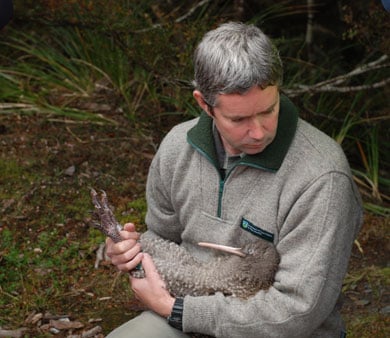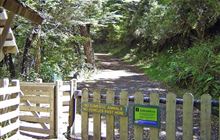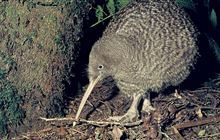Kiwi relocated to Flora
Archived content: This media release was accurate on the date of publication.
Introduction
Two great spotted kiwi (roroa) have been released in the Flora Valley area of Kahurangi National Park.Date: 18 April 2016

DOC Operations Manager Chris Golding with roroa released into Flora Valley
The Department of Conservation says that two great spotted kiwi (roroa) were released in the Flora Valley area of Kahurangi National Park on Monday morning.
The birds are the first of up to12 kiwi being translocated from Gouland Downs this week in an initiative led by the Friends of Flora community conservation group and supported by DOC and local iwi.
Volunteers from Friends of Flora are camping out at Gouland Downs to catch the kiwi for relocation, which will then be transported by helicopter to their new home in the Flora Valley.
Department of Conservation Motueka Operations Manager Chris Golding says there are currently around 30 kiwi in the Flora Valley and surrounding areas.
“These new arrivals will hopefully breed with the existing population this summer, increasing the genetic diversity of this small population of kiwi.”
Peter Adams of Friends of Flora says that it was really exciting for the volunteers to relocate these kiwi.
“This translocation is the final part of our 6 year plan to establish a sustainable population of roroa in the Flora/Salisbury area.
“Our volunteers will monitor these birds regularly to ensure they stay in the protected area and establish their own territories. We will also monitor how they interact with the existing population of kiwi and their breeding success.”
The names for the 12 birds have been chosen by Manawhenua Ki Mohua of Golden Bay.
Background information
Roroa
- The largest of our kiwi species, great spotted kiwi/roroa (Apteryx haastii) live in the top of the South Island, and can be found almost as far south as Greymouth, Arthur's Pass and North Canterbury.
- The total population of roroa is 15,000.
- Roroa live for over 50 years but breed very slowly and have large home ranges.
- Despite their size, chicks are still vulnerable to stoats, particularly during South Island beech mast conditions.
- Trampers on the Heaphy Track may have heard the trilling call of roroa after nightfall, or the sound of them rustling through the bush. Although present from sea level to 1,500 metres, they mainly frequent the subalpine zone of 700-1100 metres, using a wide variety of habitats.
- This chosen harsh environment could be one of their best defences against predators - conditions are tough even for a stoat, dog or cat. Although roroa are our least known species of kiwi, their numbers appear to be stable.
- At nesting time, incubation is more or less shared equally between the male and female parents.
Friends of Flora
- Friends of Flora has been controlling pests in the Flora for 15 years, and traps stoats over more than 8000 ha of high altitude bush.
- Fifteen years ago there was very little birdlife in the Flora and only one single male whio. The Flora is now at carrying capacity for whio with spill over to all the surrounding creeks.
- This is the fourth roroa translocation to the Flora. Each has been from a different source site, which should ensure sufficient genetic diversity for sustainability.
- Very little is known about the ecology of roroa. The Flora population is being intensively studied. The kiwi are fitted with radio transmitters and have been monitored remotely every fortnight since May 2010.
- To date, 9 pairs of kiwi have nested and at least 3 chicks have survived predation by stoats.
- The capture team have been in South Gouland since Sunday morning with specially trained kiwi dogs to sniff out the kiwi. They will also call the birds in at night. Captured kiwi will be held quietly in transport boxes until the helicopter arrives.
- Roroa are very sensitive to disturbance, especially noise and handling - much more so than other species of kiwi. For their welfare the translocation has been planned to minimise noise around the kiwi.
Contact
Peter Adams, Friends of Flora
Phone: +64 3 528 4664
Email: fof@fof.org.nz
Chris Golding, DOC Operations Manager, Biodiversity
Phone: + 64 27 839 9999
Email: cgolding@doc.govt.nz


